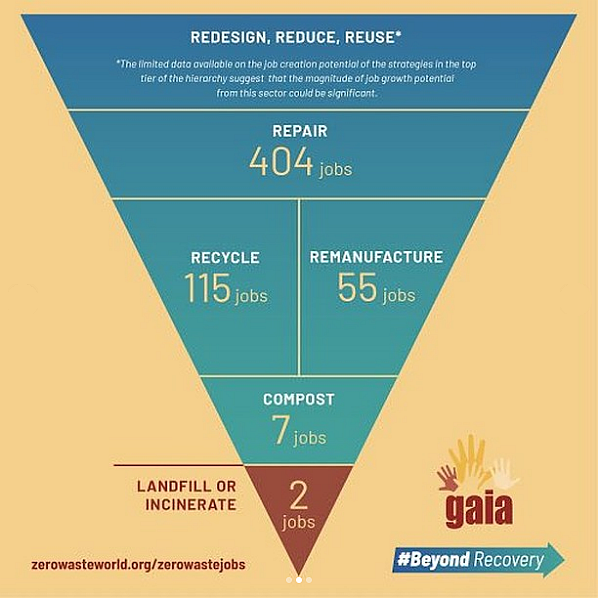Employment opportunities are important in any economy, and especially in times of economic downturn. As governments and the private sector invest in economic recovery strategies, particularly “green” or climate-neutral approaches, it is important to evaluate their employment potential.
C40 estimates that the waste management sector has the potential to create 2.9 million jobs in its 97 member cities alone.

Zero waste (0 waste)—a comprehensive approach to waste management that prioritizes waste prevention, re-use, composting, and recycling—is a widely-adopted strategy proven to minimize environmental impacts and contribute to a just society.
GAIA is publishing a report titled Zero Waste and Economic Recovery: The Job Creation Potential of Zero Waste Solutions.
The data for this study came from a wide range of sources spanning 16 countries. Despite the diversity in geographic and economic conditions, the results are clear: 0 waste approaches create orders of magnitude more jobs than disposal-based systems that primarily burn or bury waste.

This study also finds evidence for good job quality in 0 waste systems. Multiple studies of 0 waste systems cite higher wages and better working conditions than in comparable fields, and opportunities to develop and use varied skills, from equipment repair to public outreach.
Zero waste strategies can add a lot of local jobs.

We estimate the number of new jobs that can be created by diverting 80% of recyclable and compostable waste, not even counting jobs from other zero waste systems:
- Ho Chi Minh City, Vietnam would create 18,818 jobs,
- Dar Es Salaam, Tanzania would create 18,133 jobs, and
- Sao Paulo would create a whopping 36,701 jobs.
Zero waste strategies can not only create jobs, but also save municipalities money and improve economic conditions for the worst-off.
All in all,the multiple benefits of fewer waste-related environmental impacts and increased economic growth make zero waste strategies a win-win option that governments struggling to cope with the effects of the pandemic can’t afford to miss.
Reference – Beyond Recovery series publication, breakfreefromplastic newsletter,






